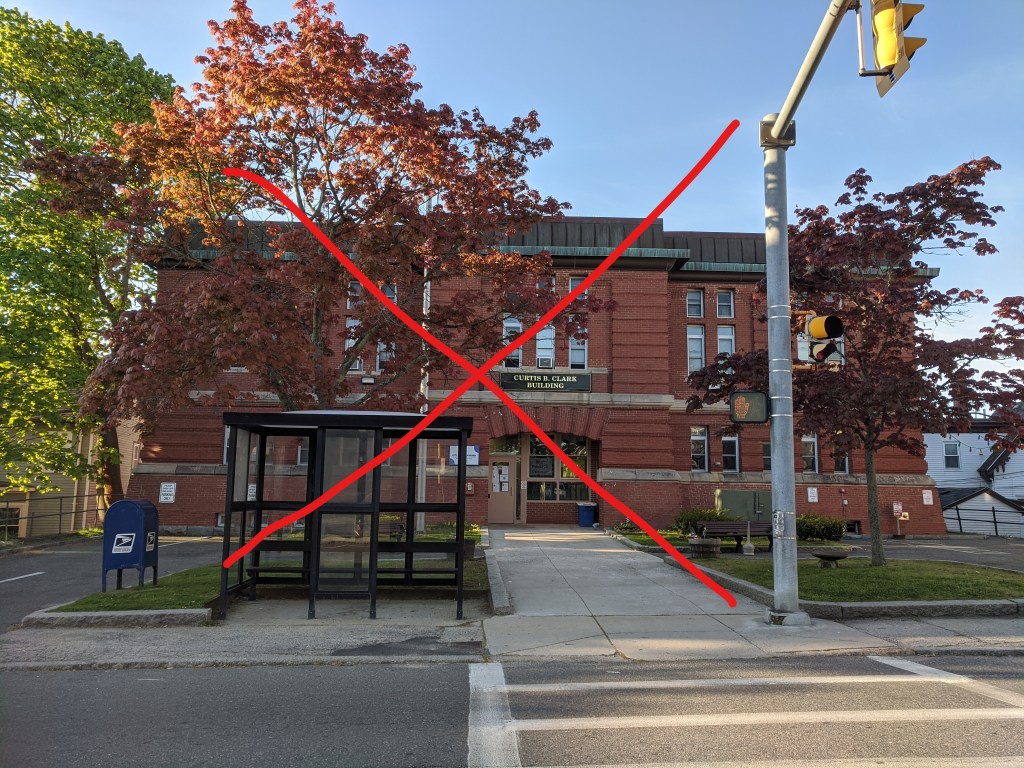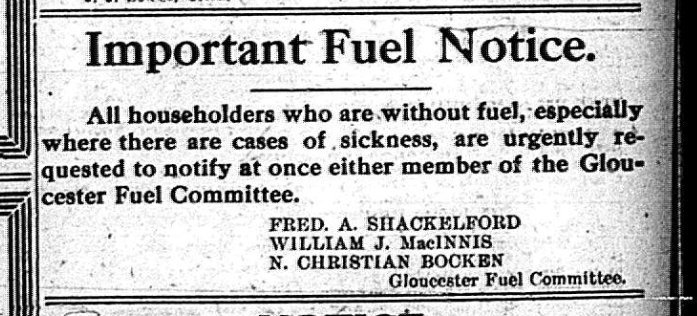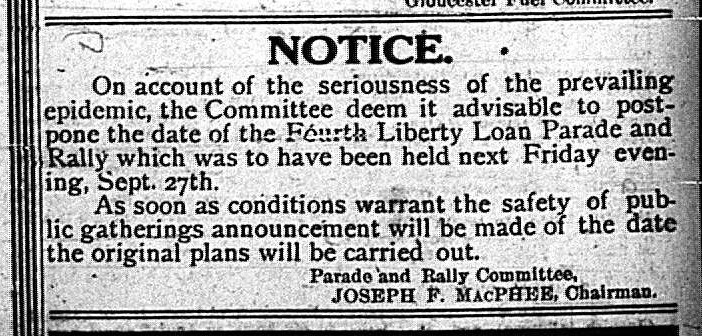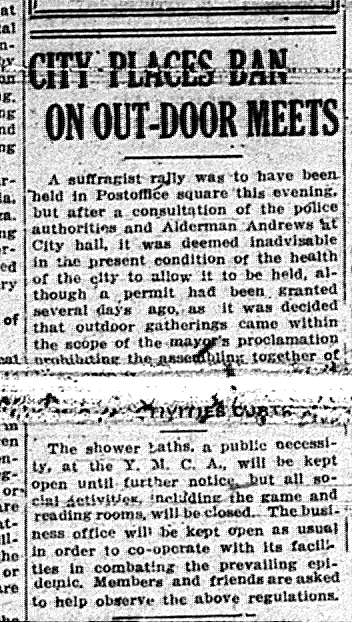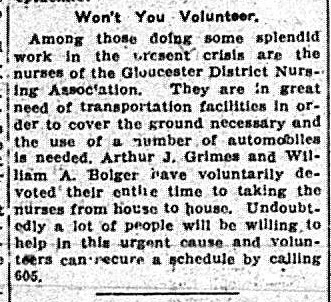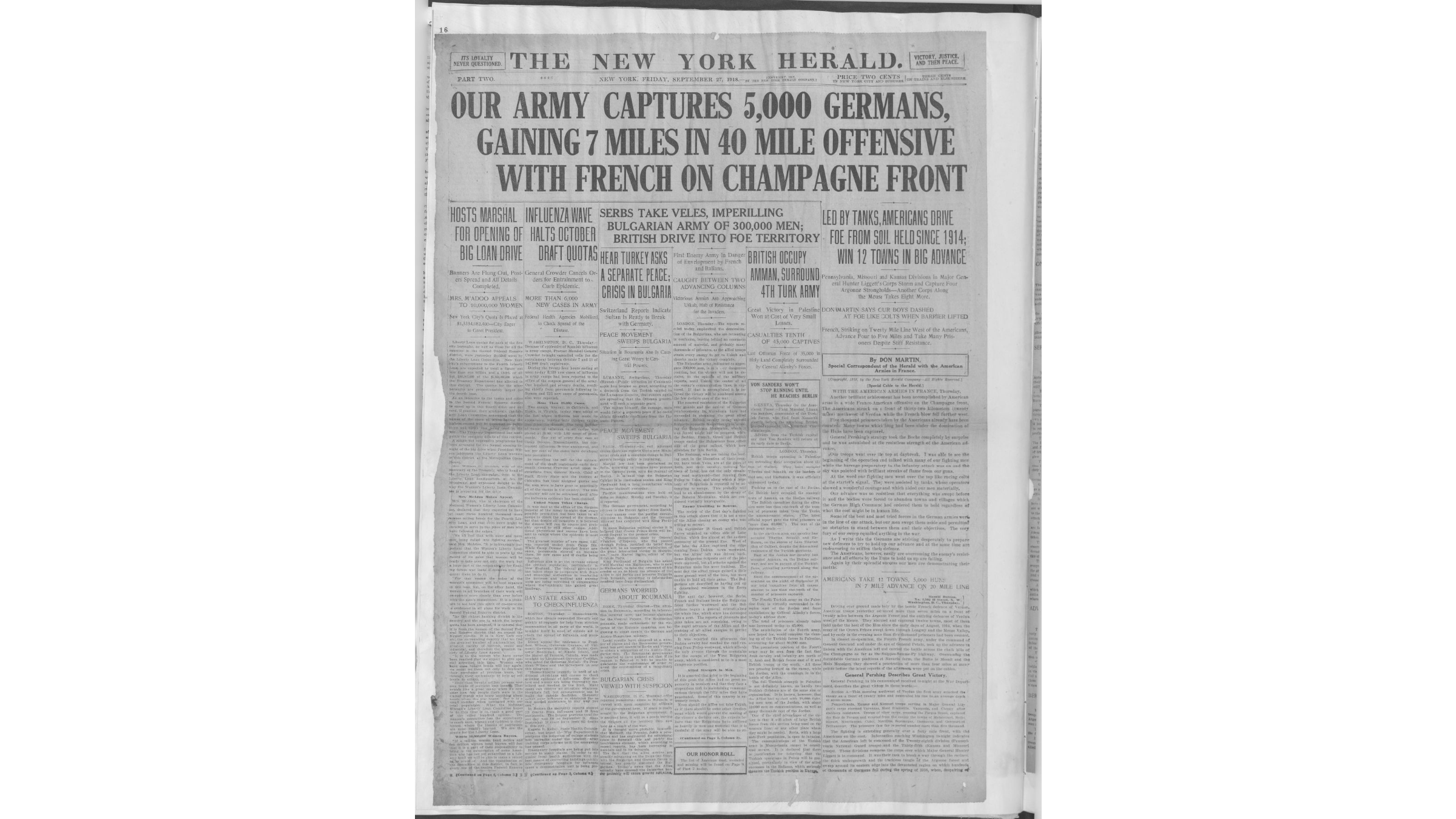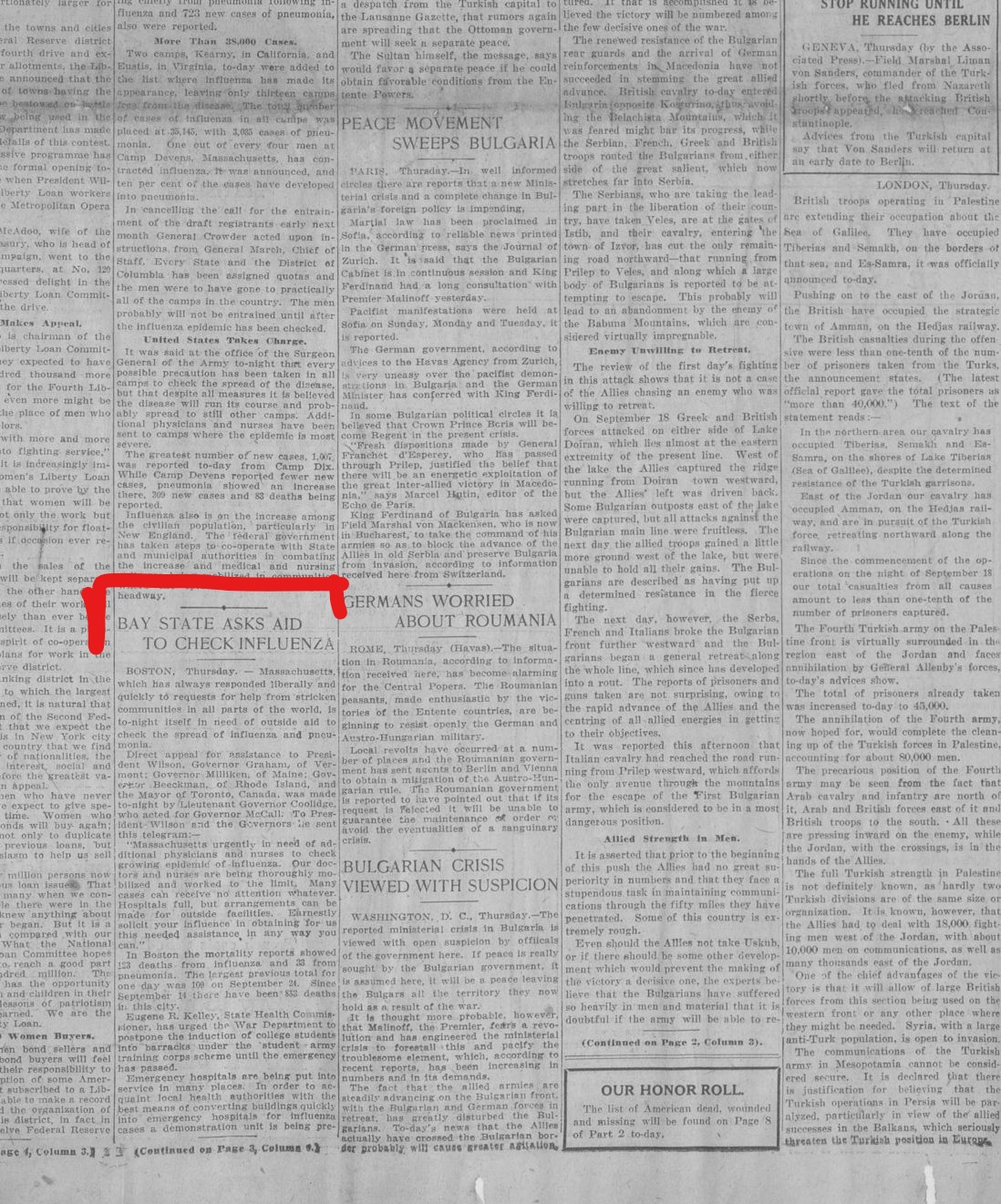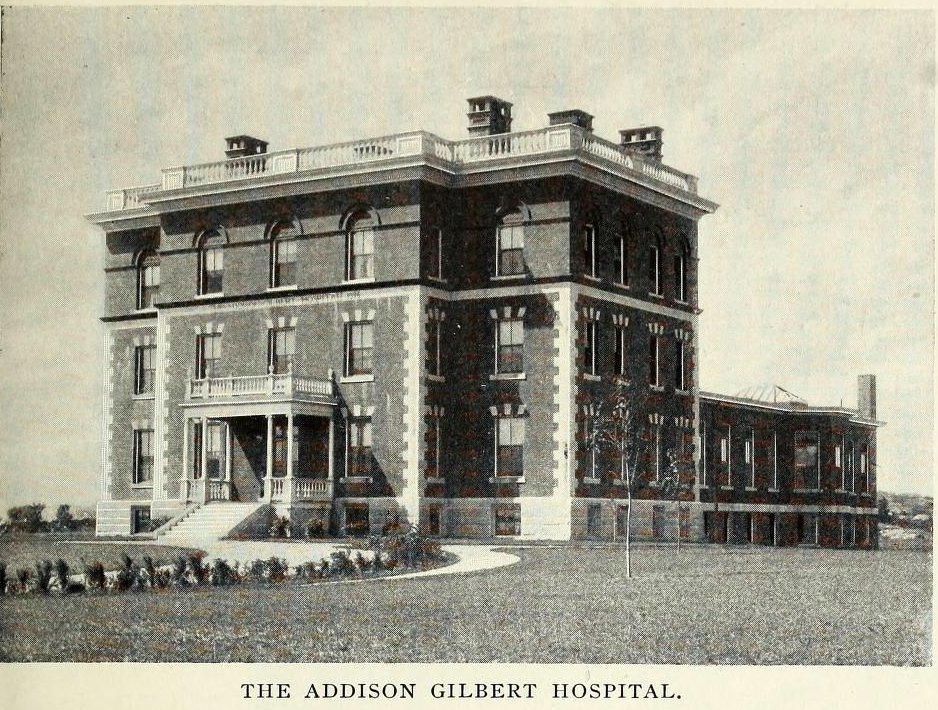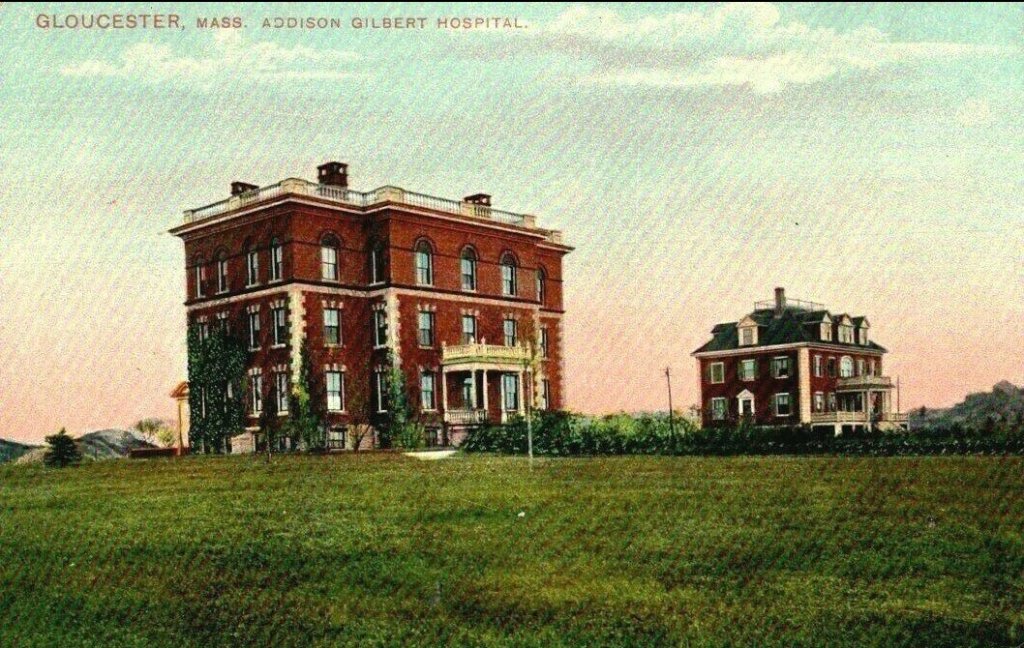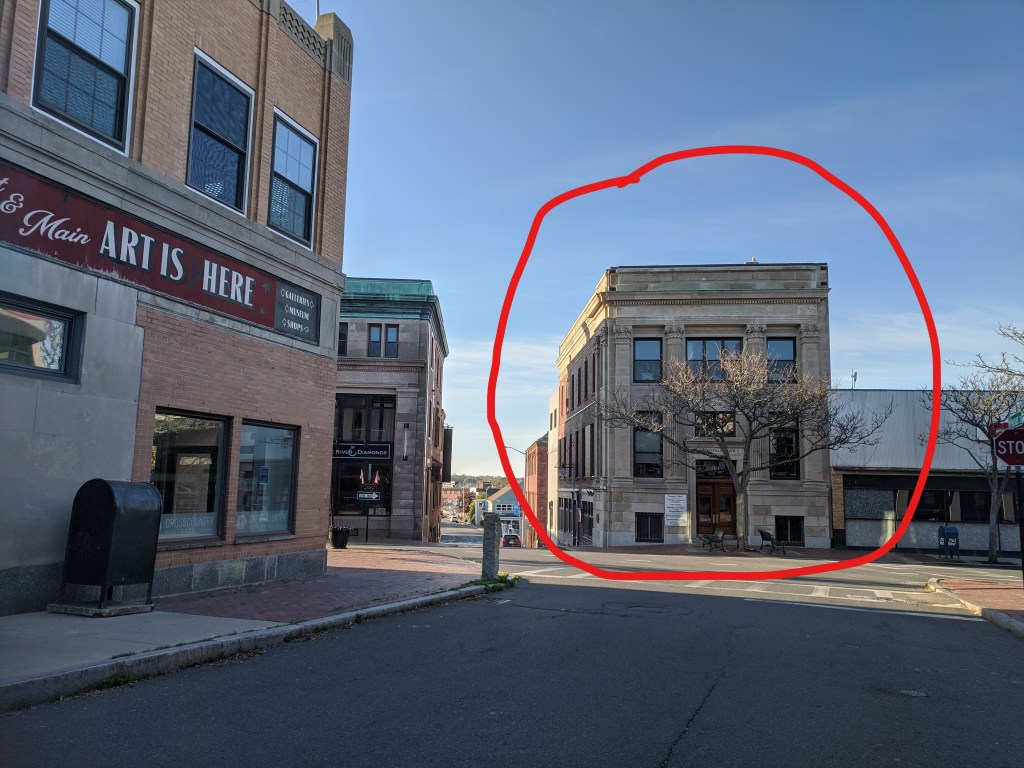The United States reached a devastating milestone of 512,000 deaths claimed by Covid-19 on February 28, 2021. A year ago when I wrote about the impact of the 1918 Flu Pandemic through a Gloucester lens, the potential lethality of Covid-19 was sobering and hard to fathom. In modern times, deaths caused by Covid-19 in the United State could never climb as high as the 1918 Pandemic, right? Wrong. In this year of living grievously, 500,000 deaths is a grim new record. We are so deeply sorry to all who endure the loss of someone close, to long haulers struggling to heal, and to caregivers who face so much.
This excerpt has been adapted from The 1918 Pandemic: Reconstructing How the Flu Raged Then Flattened in Gloucester, Massachusetts when 183 Died in 6 weeks, by Catherine Ryan, March 2020. Posts like this one, Part 5, offer select weeks during the outbreak as serialized chapters.
September 20, 1918
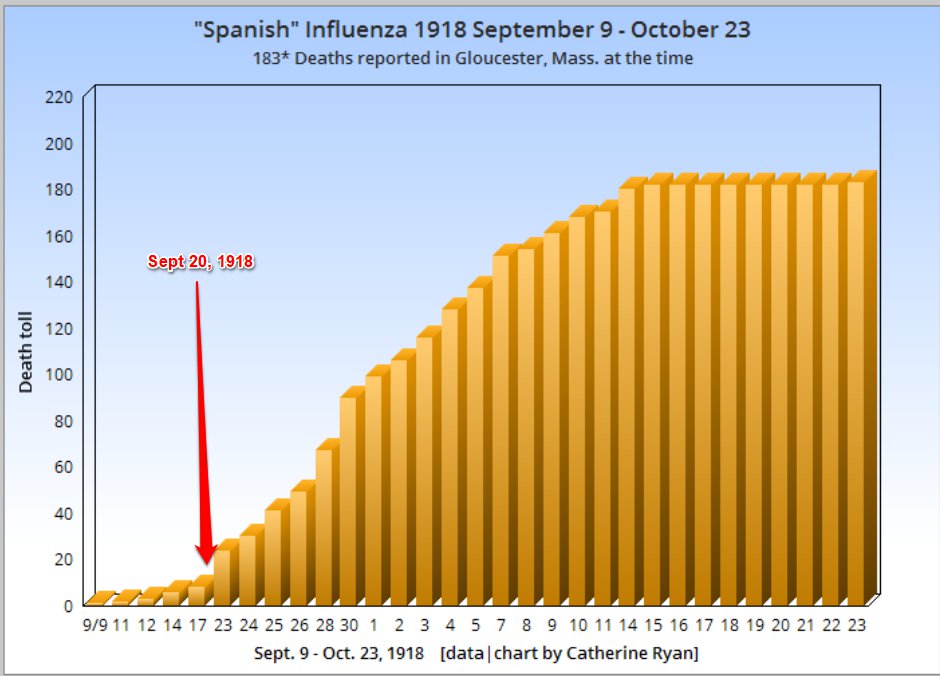
As the death toll doubled, the local paper tried to keep pace with death notices and tributes. One week after an outbreak at the post office, the paper published an obituary for William L. Jeffery, the first local shop owner to die from influenza. His stationery store was located on Pleasant street, same as the Post Office. Another man known to many in town, George Goldthwaite, a salesman for the Gloucester Gaslight Company who acted in community theater, succumbed. “Only last July he took part in the play “Two Burglars and a Lady” at the Playhouse-on-the-Moors.”
Mr. and Mrs. Martin on Fort Square died from influenza within three days of each other. “The family came to this city a few years ago when the gill netter fishermen from Michigan took up their residence here.”
“The couple are survived by four children Violet, aged 9 years, Gladys, aged 7; Lilian, aged 5, and Delores, 3 years of age.”
Four orphans- sad death notice for Mr. and Mrs. Martin – September 20, 1918
September 23, 1918
On September 23, 1918 Boston reported 23 new deaths from influenza; Gloucester, 11.
At the post office where the disease had surged, nine staff still struggled. While letter carrier Hodsdon recovered from the malady, his wife Ethel (Wheeler) Hodsdon died at home.
September 24, 1918
Cases in East Gloucester ramped up September 24th. A few vessels returned with sick crew. Sawyer Free Public library closed. Physicians and nurses from other towns arrived to help. Polling locations were open for the primary, but voter turnout was the smallest on record. Church attendance was small, “on account of the large number of persons afflicted and those who kept away.”
There were so many new cases in Gloucester, officials enlarged the temporary Red Cross emergency hospital at the police station (and would again), clearing out the District Court floor.
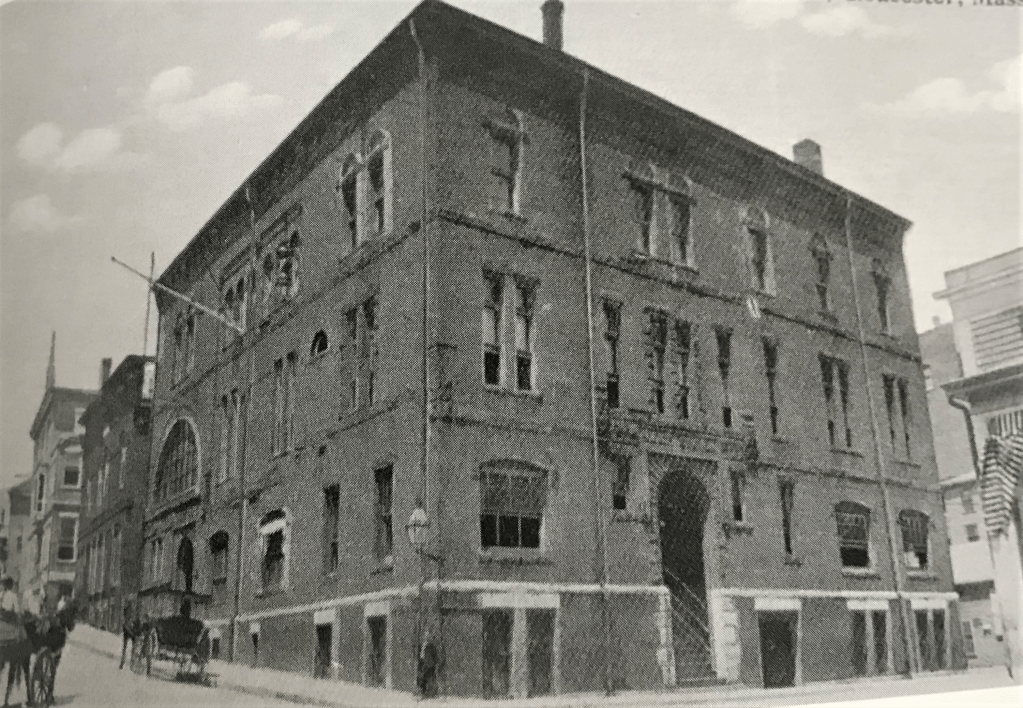
Police station at the corner of Duncan and Rogers.
Top two floors were transformed to accommodate the Red Cross Emergency Hospital during the pandemic
Still, more hospital beds were necessary. The State Armory on Prospect Street seemed the ideal site to ready, however the State refused the request.
Alderman (City Councilor) Poole headed to Boston with Osborne Knowles, Christian Saunders and John Radcliffe, representatives from Gloucester’s Board of Health and Public Safety, to negotiate with state and federal officials in person.
“That the authorities were fully cognizant of conditions in Gloucester was evident from the statement of Mr. Long, who said that Revere, Quincy and Gloucester were the most infected of any in the state. Mr. Long offered the committee every assistance and relief that could be given to handle the situation…In the opinion of state officials and leading physicians the out-door method of treating the disease is the most effective and successful. So interested were the officials in the local situation that the surgeon-general’s department yesterday afternoon notified Capt. Carleton H. Parsons, senior officer of the local state guard units; instructing him to present to the local authorities the offer of the state to send to Gloucester a military hospital unit to cope with the situation.”
Lieut. John A. Radcliffe, State Guard, resident, and veteran Gloucester Daily Times (GDT) reporter of nearly 20 years & volunteer on the Board of Health for 15 prior to the pandemic
The state discussions prompted additional protective measures, informed by the best doctors in the armed services. There were more cases in Massachusetts by then than all the other states combined. Influenza cases at Camp Devens had already climbed to 11,000.
The Gloucester contingent left the Boston conference armed with a state of the art plan for a crisis team to be deployed in Gloucester: a military unit of doctors, nurses and multiple local State Guard companies. It would be the first one established for care of civilians.
All necessary presentations and votes were sorted by nightfall.
“The adjutant general’s department in Boston was immediately communicated with, and arrangements made to send tents, physicians, nurses’ field kitchen, military equipment and supplies to this city.”
John Radcliffe, Gloucester Daily Times
Meanwhile, another floor was added to the Red Cross Emergency Hospital, State Guard called out, and police instructed to enforce any Board of Health recommendations such as the anti-spitting rule and fruit stand closures. Various strict fumigation requirements were put into immediate effect and there would be no crowding on street cars. Police officers were dispatched to The Fort and to investigate sanitation conditions.
Without calling it a quarantine, mighty efforts to effectively shut Gloucester down ensued. Cancellation and support notices landed on the front page.
The City banned outdoor gatherings now, too. A women’s suffragist meeting and Liberty Loan rallies were among the first cancellations. Gloucester District Nursing Association sought volunteer drivers.
“Gloucester calls her people to rise promptly to the emergency!” urged the Gloucester Daily Times Op Ed.
In local war news at this time, Gloucester advocates were seeking reimbursement from the federal government for vessels sunk by submarine– while pressing for flu support.
Statewide the precise number of infected cases was a guess at best. It would be a week before reporting deaths was required by state law, ten days after Gloucester so ordered.
September 25, 1918
Massachusetts established an Emergency Public Health Committee on September 25, 1918. Their first order of business was to ban all public gatherings especially in light of the upcoming liberty loan rallies and parades. It was suggested that the Federal Government was likely to take charge in Massachusetts as a war measure.
The State Board of Health published treatment guidelines the next day because of the scarcity of physicians and nurses, and push back after bans and restrictions, which Henry Endicott defended mightily:
“…There are undoubtedly towns and cities in the Commonwealth from which the influenza has not been reported, but of course we must face the fact that the chances are very much in favor of the spread of the disease. I urge such communities to assume their part of the common responsibility, and to act as if they were already in the midst of the epidemic.
The doctors and nurses of Massachusetts who are devoting themselves to the care of the sick in this emergency are all heroes and heroines, and many of them have paid the penalty. Not one of them, as far as I am aware, has shirked in any way; they have overworked; they are without sleep—yet, still they go on. Massachusetts can never repay its debt to this noble band of men and women. We are using every effort, both through the government and outside the State to get additional help for these people… (Regarding) Cancellation of the Liberty loan meetings… It will never be said of Massachusetts that she was so immersed in her own private troubles that she for one moment failed to heed the Nation’s call to practical service. Massachusetts must and will do her part.”
Henry B. Endicott, Chairman Massachusetts Emergency Public Health Committee, established Sept. 25, 1918
Dr. Kelley, Massachusetts Commissioner of Health and a member of the state’s Emergency Public Health Committee, reached out to U.S. Surgeon General Blue. The Federal government lent army and navy doctors to take over doctor assignments. Kelley appointed a nursing Commission and assigned Miss Billings from his department as chairman. They hired 100 nurses to serve in case of emergency in the Massachusetts State Guard. Fifteen were deployed to Gloucester.
“These nurses were given the rank and pay of Lieutenant. It is believed that this is the first time such rank and pay have been given to women in the United States…”
The state assigned about 10 more registered nurses to Gloucester as well.
September 26, 1918
The federal government released a detailed “Influenza” circular September 26. By then forty percent of Gloucester’s telephone company were absent “on account of sickness either of themselves or relatives whose care is devolving upon them.” The Gloucester Manufacturing Company “closed their plant indefinitely,” and the Ipswich mills announced a shut down. There were 49 deaths in the city, up from 11 three days prior, among them Laura Silva, Alderman Silva’s sister, who died that morning from “pneumonia following an attack of the prevailing influenza.”
Acting Governor Coolidge appealed to the President, select neighboring states, and the Mayor of Toronto for physicians and nurses:
“Massachusetts urgently in need of additional doctors and nurses to check growing epidemic of influenza. Our doctors and nurses are being thoroughly mobilized and worked to the limit. Many cases can receive no attention whatever. Hospitals are full, but arrangements can be made for outside facilities. Earnestly solicit your influence in obtaining for us this needed assistance in any way you can.”
Governor urgent telegrams disseminated 9/26/1918
The notice was carried in the Gloucester Daily Times and national papers the following day. New York Herald led with the capture of 5000 Germans and Bay State Governor asking for help on the front page; the New York Times published a notice on page 6.
The local paper featured its editorial: If You Love Your Fellow Man Then Give Your Aid in this Crisis;
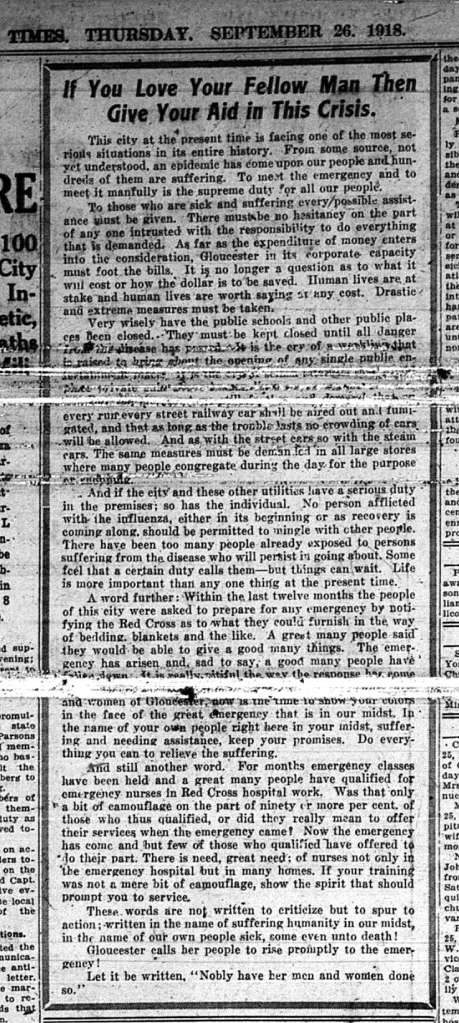
September 27, 1918
With no time to spare, the State Military Unit was installed on the grounds of Addison Gilbert Hospital Friday September 27, 1918, and completed before sundown Saturday.
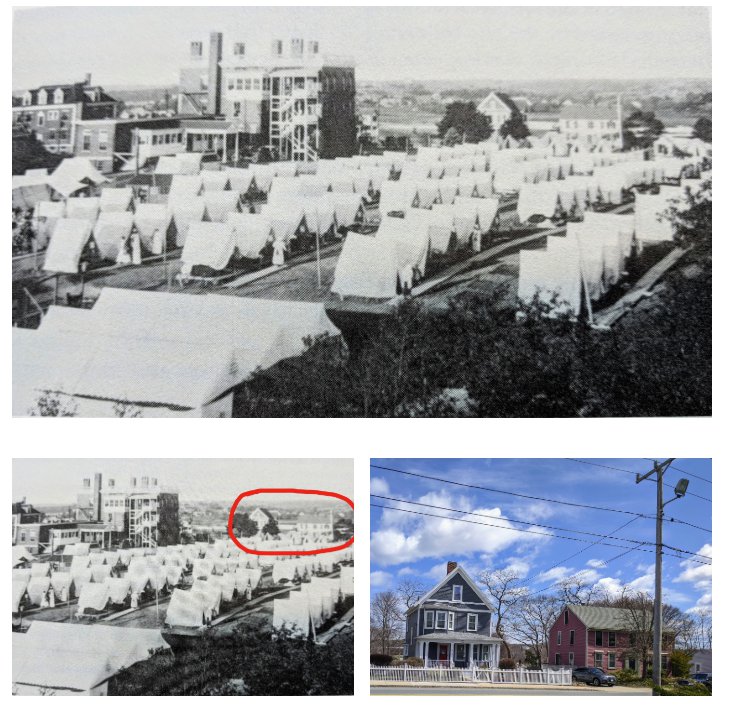
Addison Gilbert Hospital grounds during the flu epidemic 1918. Homes on Washington Street still there.
“In a remarkably short space of time the tents were up and the unit well established, so that this afternoon it will be ready for patients. There are 100 tents for patients, each waterproof, provided with board floor, cot and other essentials for the proper care of the sick…The field hospital is a wonderful institution and shows in a large measure what the State Guard can be depended upon to bring about. Day and night the men have worked to put the hospital in shape and to look out for the sick ones. It is simply remarkable the way the many details have been arranged to establish such a wonderful institution well worthy of the name. Electric lights, water, sewerage and floors in the tents have all been put in, chiefly through the efforts of the fine types of men that compose the State Guard.”
John Radcliffe, GDT
Another 100 tents for the state guard, plus any necessary for administration and operations, were installed as well.
Over on Main Street, the Red Cross established a children’s hospital in the Girl’s Club over Gloucester National Bank.
Anticipating great need, the public safety committee announced an Emergency Fundraising drive for the Local Red Cross administered by Cape Ann Savings Bank.
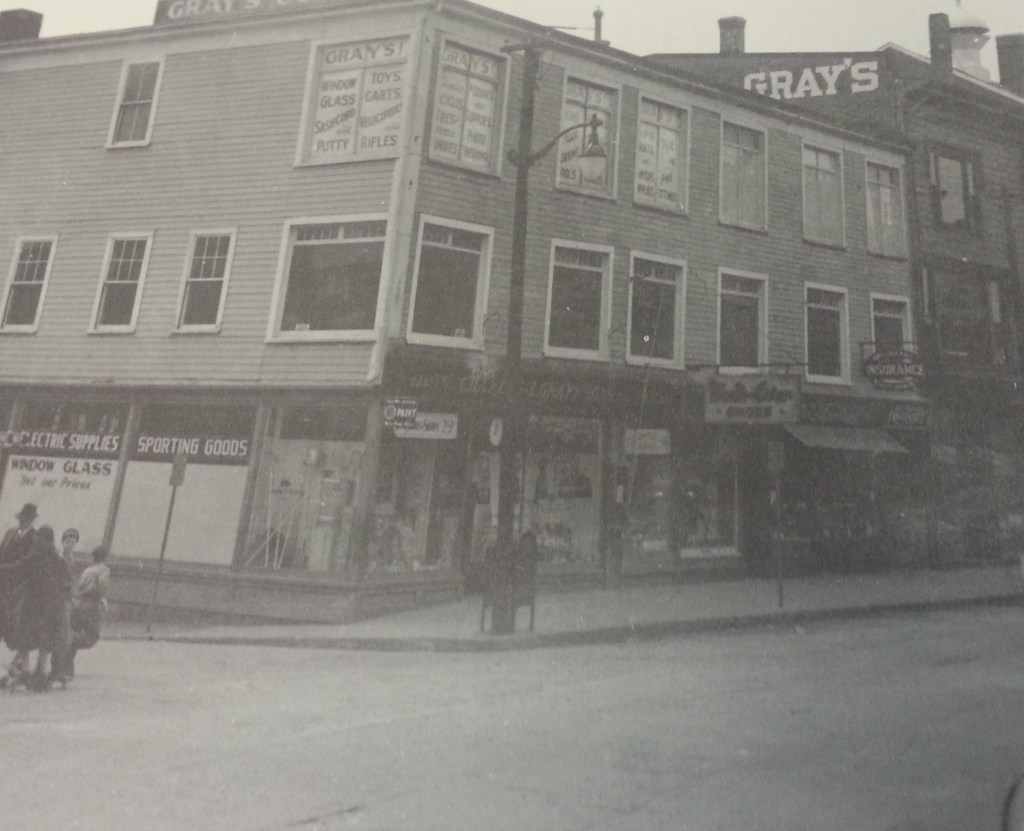
Cape Ann Savings Bank still at the end of the block on the left 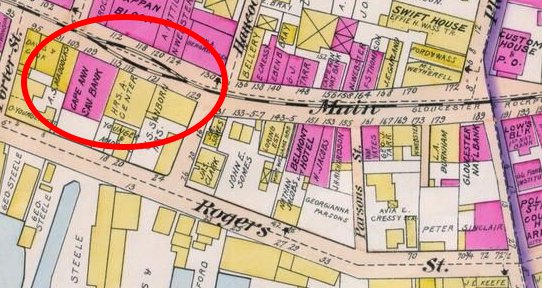
Cape Ann Savings Bank 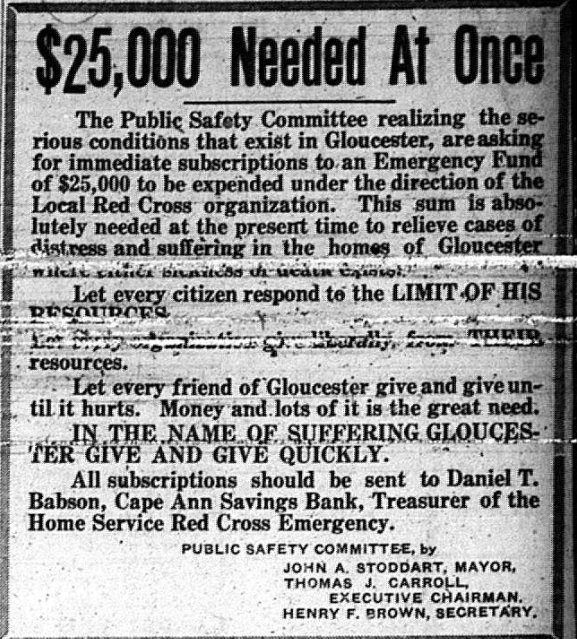
The Mayor and all but one Alderman were struck by flu—all those meetings! — and still that Monday they brought forth more precautions, seizing any and all educational opportunities and community measures possible to halt the spread. Public funerals were banned and soda fountains closed, though the latter was rescinded in one day.
Detailed flu mask (face masks) instructions were published as part of optimum patient care and prevention.
Mayor Stoddart urged fresh air and ventilation.
“Every house whether a case of disease has existed or not, should be thoroughly aired during the day…Clean up the back yards, dumps and filthy places. If your neighbor will not act, consult the Board of Health or its emergency agents and prompt action will be taken. Let everyone co-operate and assist our health officials in the excellent work they are doing.”
Mayor Stoddardt, September 30, 1918
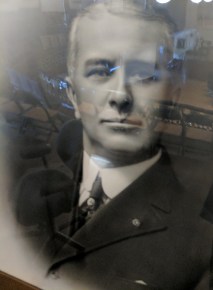
The deadline for the Draft Registration questionnaire was postponed until a future time when influenza was vanquished. One bright note that bleak weekend: ten “angel” nurses arrived from Ontario, Canada, and five from the state thanks to the commonwealth’s plea and Gloucester’s hustle. Unlike other locations during the 1918 Flu Pandemic, folks rushed here to help rather than away.
Follow along-
- Full article- 1918 Pandemic: Reconstructing How the Flu Raged Then Flattened in Gloucester, Massachusetts when 183 Died in 6 weeks, published March 2020 Good Morning Gloucester
- Excerpt part 1 Labor Day crowds before the first flu death: Gloucester during the 1918 Pandemic Part 1
- Excerpt part 2 Fierce contagion fast deaths Boston Navy Yards and Fort Devens
- Excerpt part 3 East Gloucester art exhibit and funeral announcement on the eve of WWI Draft Registration
- Excerpt part 4 Outbreak at the Post Office
- Excerpt part 5 (above) week of September 20, 1918 Gloucester Fights Back
Flu Masks / Face Masks instructions Gloucester 1918 1918 Directions for sewing face masks and the Mask Factory in #GloucesterMA – Good Morning Gloucester
